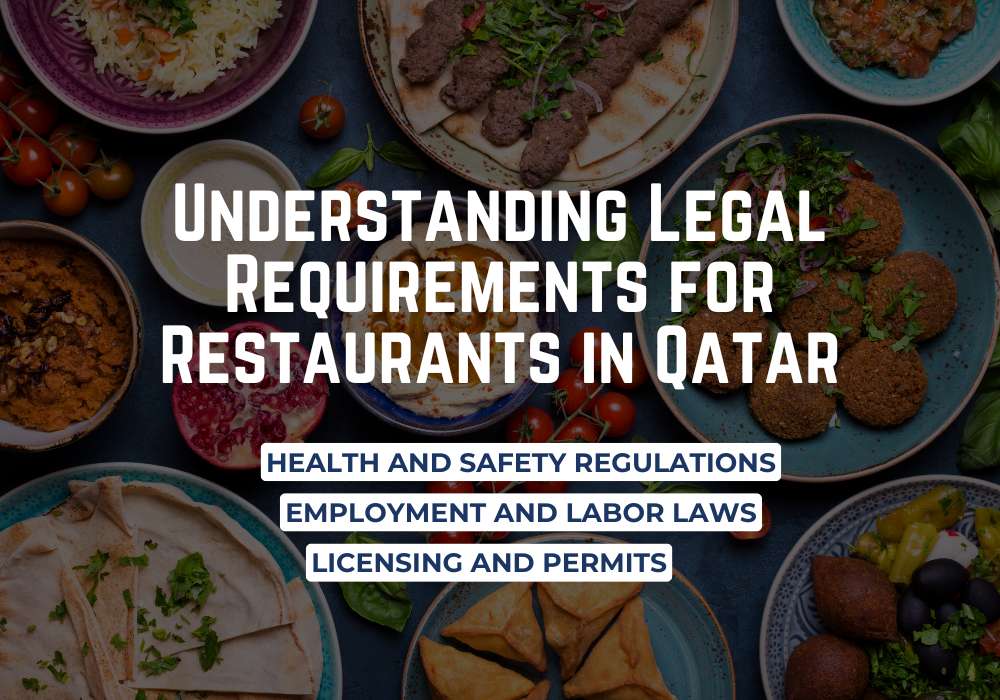Opening a restaurant in Qatar presents an exciting opportunity in a vibrant and culturally rich market. However, understanding the legal requirements for restaurants in Qatar is crucial to ensure a smooth and successful operation. Knowing these requirements helps in navigating the regulatory landscape, avoiding potential fines, and ensuring the business runs efficiently.
When setting up a restaurant in Qatar, it is vital to be aware of key legal aspects such as obtaining the necessary licenses and permits. The regulatory framework in Qatar demands strict adherence to health and safety regulations to protect both employees and customers. Employment and labor laws are also significant, ensuring fair treatment and rights for all workers in the hospitality industry.
Food safety and hygiene standards in Qatar are stringent to maintain public health and wellness. Compliance with these standards is non-negotiable and must be met to avoid legal issues and ensure customer trust. Additionally, understanding and respecting local cultural norms and practices is essential for operating harmoniously within the community.
By comprehensively understanding the legal requirements for restaurants in Qatar, entrepreneurs can effectively address regulatory challenges and focus on delivering exceptional dining experiences. This knowledge not only ensures compliance but also enhances the restaurant’s reputation and operational success.
Introduction to Legal Requirements for Restaurants in Qatar
Overview of Setting Up a Restaurant in Qatar
Starting a restaurant in Qatar can be a promising venture given the country’s bustling food scene and diverse demographics. Whether you aim to open a high-end dining establishment or a casual cafe, understanding the legal framework is essential for a seamless operation. The legal requirements for restaurants in Qatar include a variety of regulations, from obtaining necessary licenses to adhering to stringent health and safety standards. Navigating these requirements effectively can set a solid foundation for your restaurant business.
Importance of Understanding Legal Requirements for Restaurants in Qatar
Comprehending the legal requirements for restaurants in Qatar is crucial for several reasons:
- Avoiding Legal Issues: Adhering to local laws helps you avoid fines, closures, and legal disputes that can arise from non-compliance.
- Ensuring Customer Trust: Meeting health and safety standards fosters trust and loyalty among customers, enhancing your restaurant’s reputation.
- Smooth Business Operations: Proper licensing and compliance ensure your restaurant can operate without interruptions, contributing to overall business success.
- Cultural Sensitivity: Understanding and respecting local cultural norms can enhance your restaurant’s acceptance and popularity within the community.
Overall, grasping these legal requirements is not merely about compliance; it’s about building a sustainable and successful restaurant business in Qatar.
Setup Your Restaurant in Qatar! We Will Assist You From A-Z.

Key Legal Requirements for Operating a Restaurant in Qatar
Licensing and Permits
Obtaining the proper licenses and permits is a critical first step in establishing your restaurant in Qatar. The specific requirements can vary, but generally, you will need:
- Commercial Registration: This is the first step in legally conducting business in Qatar. It involves registering your business with the Ministry of Commerce and Industry.
- Trade License: Issued by the municipality where your restaurant will operate, this license grants you permission to conduct business in that specific location.
- Food License: You must obtain a food license from the Ministry of Public Health to ensure that your restaurant meets all necessary food safety standards.
- Signage Permit: If you plan to have any signs outside your restaurant, a signage permit is mandatory. This ensures your signs adhere to local regulations.
Health and Safety Regulations
Health and safety regulations in Qatar are stringent to protect consumers and employees. These regulations require that restaurants:
- Adhere to Fire Safety Standards: Restaurants must comply with fire safety measures, which include having smoke detectors, fire extinguishers, and clearly marked emergency exits.
- Maintain Cleanliness: Regular cleaning schedules must be established to maintain high standards of hygiene in the kitchen and dining areas.
- Provide Sanitary Facilities: Adequate restroom facilities must be clean and accessible to both staff and customers.
Employment and Labor Laws
Understanding and complying with employment and labor laws in Qatar is essential for running a restaurant. Key aspects include:
- Work Visas and Permits: All foreign employees must have valid work visas and permits, which need to be secured through the Ministry of Administrative Development, Labor and Social Affairs.
- Employment Contracts: Written employment contracts are mandatory and must outline the terms of employment, including salaries, working hours, and job responsibilities.
- Minimum Wage Compliance: Ensure that all employees are paid at least the minimum wage set by Qatari law.
- Health Insurance: Employers are required to provide health insurance for their employees.
Food Safety and Hygiene Standards
Food safety and hygiene are paramount in the restaurant industry. In Qatar, these standards are governed by the Ministry of Public Health and include:
- Food Handling Training: All staff must undergo food safety training to ensure they understand proper hygiene practices.
- Regular Inspections: The Ministry of Public Health conducts regular inspections to ensure compliance with food safety standards.
- Safe Food Storage: Proper storage facilities must be in place to prevent contamination and ensure that food is kept at appropriate temperatures.
- Safe Preparation Practices: Staff must follow guidelines for safe food preparation to avoid cross-contamination and foodborne illnesses.
Compliance with Local Cultural Norms and Practices
Respecting local culture is crucial when operating a restaurant in Qatar. Key considerations include:
- No Alcohol Service: Unless you have a special license, serving alcohol is prohibited in most public restaurants.
- Respectful Dress Code: Staff should dress conservatively, adhering to local cultural norms.
- Prayer Time Observance: Be mindful of prayer times, which might require adjustments in business operations.
- Menu Considerations: Ensuring your menu respects cultural and religious dietary restrictions, such as offering halal food, is essential.
In conclusion, understanding the legal requirements for restaurants in Qatar is crucial for anyone looking to establish or operate a successful food business in the region. Setting up a restaurant in Qatar involves navigating through a multifaceted landscape of licensing and permits, health and safety regulations, employment and labor laws, food safety and hygiene standards, and adherence to local cultural norms and practices.
Acquiring the necessary licenses and permits is the first step, ensuring that your business operates legally and smoothly. Health and safety regulations must be strictly followed to guarantee a safe environment for both staff and customers. Moreover, compliance with employment and labor laws is essential to maintain a fair and equitable workplace. Ensuring high food safety and hygiene standards is paramount to protect public health and uphold your restaurant’s reputation. Lastly, respecting local cultural norms and practices not only demonstrates cultural sensitivity but also helps in establishing a positive rapport with the community.
By fully comprehending and adhering to these legal requirements, restaurant owners can avoid potential legal issues and foster a thriving business. Therefore, investing time and resources into understanding these legalities can pave the way toward a sustainable and reputable restaurant operation in Qatar.
Setup Your Restaurant in Qatar! We Will Assist You From A-Z.






